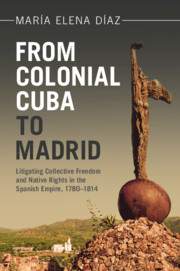 From Colonial Cuba to Madrid
From Colonial Cuba to Madrid Book contents
- From Colonial Cuba to Madrid
- Afro-Latin America
- From Colonial Cuba to Madrid
- Copyright page
- Contents
- Figures and Tables
- Acknowledgments
- Introduction
- 1 Imperial Reform, Privatization, and Enslavement
- 2 An Unorthodox Pueblo and Its Apoderados
- 3 Making the Case for Collective Freedom
- 4 Native Bonds, Native Rights
- 5 The Council’s Ruling and the Politics of Litigation
- 6 A “Pernicious” Communication
- 7 Violence, Marronage, and Litigation
- 8 The Final Outcome of the Case
- 9 The Nineteenth-Century Afterlife of the Freedom Edict of 1800
- Conclusion
- References
- Index
8 - The Final Outcome of the Case
Published online by Cambridge University Press: 14 November 2024
- From Colonial Cuba to Madrid
- Afro-Latin America
- From Colonial Cuba to Madrid
- Copyright page
- Contents
- Figures and Tables
- Acknowledgments
- Introduction
- 1 Imperial Reform, Privatization, and Enslavement
- 2 An Unorthodox Pueblo and Its Apoderados
- 3 Making the Case for Collective Freedom
- 4 Native Bonds, Native Rights
- 5 The Council’s Ruling and the Politics of Litigation
- 6 A “Pernicious” Communication
- 7 Violence, Marronage, and Litigation
- 8 The Final Outcome of the Case
- 9 The Nineteenth-Century Afterlife of the Freedom Edict of 1800
- Conclusion
- References
- Index
Summary
Chapter 8 focuses on the imperial state level to examine the legal and political logic informing the final adjudication of the case in 1799, a decision that constituted a shift in the decisions the Council of the Indies and colonial tribunals had been taking in the 1780s. The chapter examines the political reasons related to mining utility and security that informed the shift and the juridical basis imperial jurists used to ground the case’s outcome. Ultimately, the Bourbon Crown ruled in favor of the cobreros but attached caveats related to Indian law to their collective freedom. The chapter ventures into the immediate aftermath of the Freedom Edict of 1800 to examine the challenges that emerged in the colony regarding the actualization of the decreed emancipation. It also interrogates the possibility of compensation or reparations to the cobreros for their wrongful enslavement.
Keywords
- Type
- Chapter
- Information
- From Colonial Cuba to MadridLitigating Collective Freedom and Native Rights in the Spanish Empire, 1780–1814, pp. 257 - 284Publisher: Cambridge University PressPrint publication year: 2024
